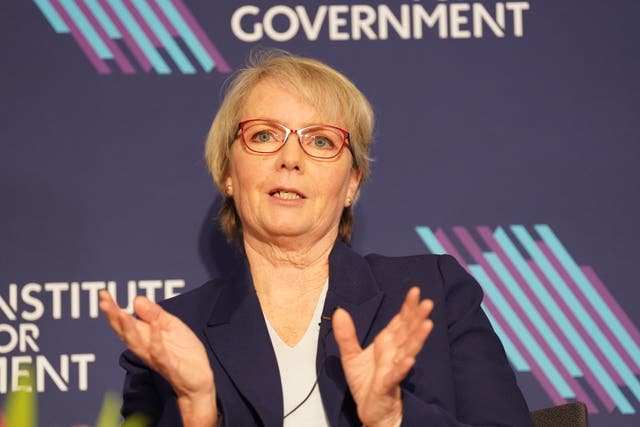British Transport Police confirms search policy change in light of gender ruling
It came as the head of the equalities watchdog branded the court judgment ‘enormously consequential’.

A police force has become one of the first to confirm it has changed its strip search policy in the fallout from the Supreme Court ruling on the definition of a woman.
British Transport Police (BTP) said a day after the judgment that it had adopted a new “interim position” which will see trans people held in custody strip searched by an officer in line with their birth sex.
This means trans women in custody will be searched by male officers, while officers who are trans women will no longer be able to search female detainees – although BTP stressed that someone can object and ask to be searched by another officer.
The public confirmation of a policy change came as the head of Britain’s equalities watchdog said Wednesday’s ruling means trans women cannot use single-sex female toilets or changing rooms or compete in women’s sports.
Equality and Human Rights Commission (EHRC) chairwoman Baroness Kishwer Falkner said the ruling by the UK’s highest court was “enormously consequential”, as she vowed to pursue organisations which do not update their policies.
The ruling that the terms woman and sex in the 2010 Equality Act “refer to a biological woman and biological sex” means transgender women with a gender recognition certificate (GRC) can be excluded from single-sex spaces if “proportionate”, the Supreme Court said.
Baroness Falkner said organisations should be “taking care” to look at the “very readable judgment” to “understand that it does bring clarity, helps them decide what they should do”.
A spokesperson for BTP said: “Under previous policy, we had advised that someone with a Gender Recognition Certificate (GRC) may be searched in accordance with their acquired sex, however, as an interim position while we digest yesterday’s judgment, we have advised our officers that any same-sex searches in custody are to be undertaken in accordance with the biological birth sex of the detainee.
“We are in the process of reviewing the implications of the ruling and will consider any necessary updates to our policies and practices in line with the law and national guidance.”
The change does not apply to regular searches such as those done over clothing.
The National Police Chiefs’ Council (NPCC) said it will be reviewing its policies and procedures, but “will need time to consider the full implications of the court’s decision, as will many other public bodies”.
On other issues such as toilets, changing rooms and sports, Baroness Falkner echoed the Government in saying the ruling had brought “clarity” to providers on their duties under equality law around single-sex spaces.
Asked if it was now simple that trans women cannot take part in women’s sport, she told BBC Radio 4’s Today programme: “Yes, it is.”
On changing rooms and toilets, Baroness Falkner said: “Single-sex services like changing rooms must be based on biological sex.”
She said there is no law against organisations providing a third space such as unisex toilets and suggested trans rights organisations “should be using their powers of advocacy to ask for those third spaces”.
The commission is expecting to lay an updated statutory code of practice before Parliament by the summer, and has said it is working “at pace to incorporate the implications of this judgment” into the code for public bodies setting out their duties under the Equality Act.

Asked on Thursday when new guidance would be given on how to apply the law, Chancellor Rachel Reeves said it would come from the commission “in due course” and repeated the Government’s previous comment that the ruling gives “the clarity that’s needed to move forward”.
Baroness Falkner said the commission evaluates when the law is not followed by organisations and can speak to those bodies, or “use enforcement, compliance tools or whatever, we will be continuing to do that”.
Regarding single-sex hospital wards, she said the NHS will “have to change” their 2019 policy, which says that trans people “should be accommodated according to their presentation”.
Baroness Falkner said the court ruling means there is now “no confusion” and the NHS “can start to implement the new legal reasoning and produce their exceptions forthwith”.
Officials said they were already updating the guidance but the judgment will be considered as they move forward.
Care minister Karin Smyth told BBC Breakfast the “NHS will obviously be complying” along with “every other public body”.
She said she hopes the ruling will draw a line under arguments over gender recognition, but accepted more “homework” needed to be done on what it will mean in practice.

Meanwhile, education unions have urged the Government to provide clear guidance to schools and colleges on how to interpret the law in regard to children questioning their gender, amid concerns from teachers about the implications for their pupils following the ruling.
The Supreme Court decision was hailed as a victory by women’s rights campaigners, but LGBT charity Stonewall described the judgment as “incredibly worrying for the trans community”.
Baroness Falkner said while the ruling is a “victory for common sense”, this is only the case “if you recognise that trans people exist”.
She added: “They have rights, and their rights must be respected – then it becomes a victory for common sense.”
She said it was “not a victory for an increase in unpleasant actions against trans people”.
She added: “We will not tolerate that.
“We stand here to defend trans people as much as we do anyone else. So I want to make that very clear.”
Elsewhere, Conservative leader Kemi Badenoch signalled she was supportive of reviewing laws on equality and gender recognition in light of the ruling.
Speaking during a local election visit to Cambridgeshire, Mrs Badenoch told broadcasters: “I think that a review of equality acts, and the Gender Recognition Act is a good idea, to “ensure that they (laws) are there to prevent discrimination, not for social engineering”.





